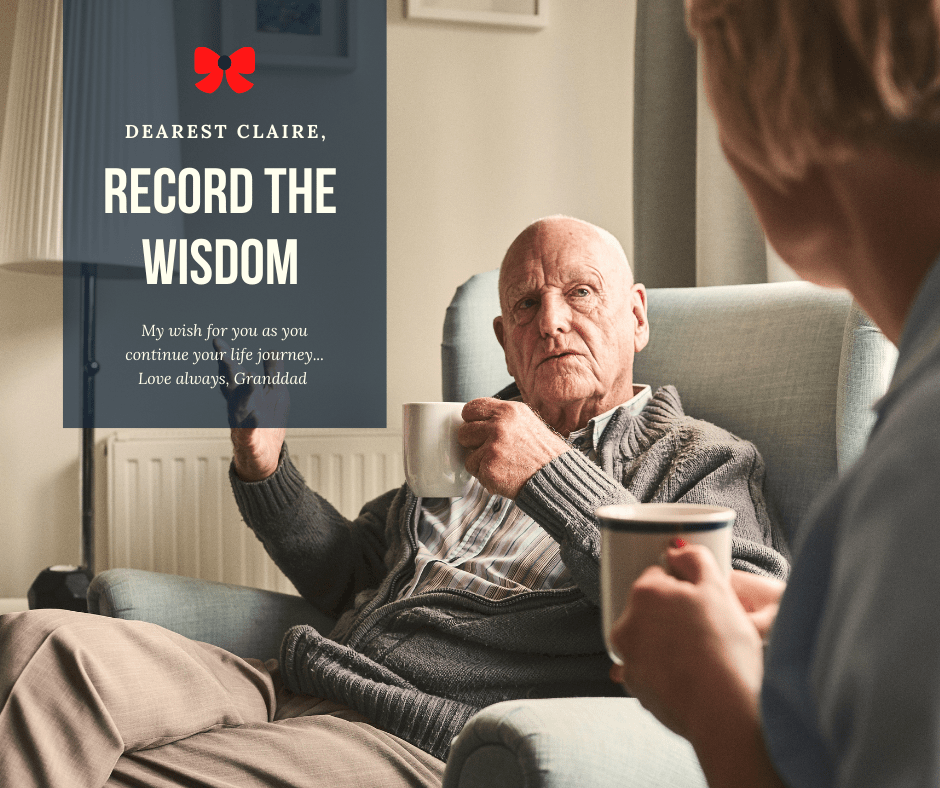I noticed my anxiety starting to peek over the rim of my teacup during my self-care breaks, like a reticent critter checking to see my reaction. Then, I felt myself become tense when I sat down for the afternoon chat with Dad. Our chats had turned into a re-hash of what his disease was called, the expected progression, and the fact that the treatment targeted symptoms solely. He was becoming more and more anxious about the diagnosis and preoccupied with finding a cure. I was slowly accepting that this would most likely be Dad’s last Christmas. It was time to start having conversations that would bring closure to relationships. It was time to begin to hear the final words of wisdom that Dad had accumulated in his 99 years.
Dad’s anxiety fueled my fears and feelings of losing control. At one point, Dad decided that he was going to pursue a lung transplant and began making phone calls. He would not be deterred. If he could not get one in this country, he would find a country willing to give a 99-year-old a new set of lungs. The more preoccupied he became, the more I found myself focused on trying to solve his trying to solve the problem. I recognized that I needed to place boundaries around my thoughts and emotions, too attached now to his worry. I made a plan.
Help from the hospice team
I thought that peer counseling might help and reached out to the hospice social worker. I hoped that she knew someone who had the disease who Dad might talk with, maybe another WWII vet. She said she had some ideas. She also offered to visit and discuss literature about lung disease that Dad could read later under his magnifier. I had resisted most visitors due to COVID, but it was time to make an exception. I also asked for advice on talking with Dad when he seemed anxious. Knowing that I would be empowered with a better way to manage the situation, immediately calmed my anxiety. We had the start of a plan. Then, she was out for a family emergency. After returning, but before visiting, she was reassigned. This is caregiving.
Our new hospice social worker had a few additional ideas. In lieu of a peer, she will have a chaplain come to talk with Dad. In addition, an intern, a male social worker, is currently part of the hospice team and he can visit every two weeks. She recommended that I share with Dad the valuable lessons he taught me and how much I appreciated his wisdom and guidance. Whew! I only had a few hours with Mom before she passed. This conversation is important. It feels somehow more daunting when I have time to think about it and plan what I want to say.
The hospice worker also recommended that I ask Dad what messages he would like to share with his son and granddaughter.
The gift revealed itself
As I was nervously thinking about how to approach the conversations with Dad, I had an idea that was a gift in more ways than one. The holidays are here, and a video card from Dad would be a great gift for my brother and niece. When I presented the idea to Dad, he was enthusiastic. As he thought about what he might say, he became more reticent. I assured him that he had much wisdom to offer from his 99 years, and I would help by prompting him with questions. I gently helped him understand the significance of his words and our endevour.
I plan to edit the video clips and add some holiday elements, including photos from past holidays and holiday music. These will be meaningful gifts that will be cherished for years to come. I wish I had not waited this long to have and record these messages. I wish I had done it a year ago, two years ago. Dad would have had much more to say. Now is better than never!
It was a difficult, emotional conversation. When I focused on the wonderful gift it will become, I was grateful to help Dad share his wisdom with his son and granddaughter. I also have the gift of the memory.
Conversation starters
If you are contemplating an end-of-life conversation with a family member, I found that using the holiday was a comfortable way to broach the subject. I could imagine using a similar approach around a birthday or as a Mother’s Day gift from mom to daughter and granddaughter, Father’s Day, etc.
If you like this idea but are struggling to get the conversation going, check out Caring Cards. These cards offer conversation starter prompts that can add value to any visit or conversation. Also, Susan Alder’s 300 Questions to Ask Your Parents Before It’s Too Late offers suggestions to create meaningful interactions.
Navigating the Caregiver River: A Journey to Sustainable Caregiving is available on Amazon. Also, check out the Self-Caregiving Strategies Podcast.
Schedule Theresa Wilbanks to speak on caregiving and empower the caregivers in your workplace or community with the 12 Sustainable Caregiving Strategies.
Advice offered is for general information only; please contact your healthcare team, legal or financial advisors to guide your particular situation.

